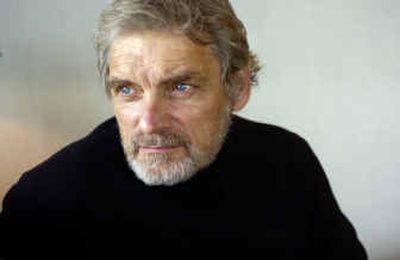Actor revisits mother in collection of poems

It’s a talent to be able to just sit. Even the Buddha had to learn how to do it.
Sitting is something that never came easily to actor David Selby, and it came even harder to his mother.
And as he says in one of the 39 poems that comprise his collection titled “My Mother’s Autumn” (Locust Grove, 70 pages, $15), “It isn’t the love we miss, it’s the time.”
“Sometimes we just don’t take the time to just sit and talk about nothing,” Selby said Tuesday afternoon over a cup of hot tea. “And both Mom and myself, well, she never learned and I’ve had a difficult time learning how to do nothing. How to sit and be comfortable with who you are.”
Selby will read from his poetry collection at 7 p.m. tonight at the Valley Barnes & Noble, 15310 E. Indiana.
Selby, 64, is best known for having portrayed Quentin Collins in the afternoon horror soap “Dark Shadows” and later Richard Channing in the nighttime soap “Falcon Crest.” He’s been in Spokane for the past couple of days to shoot a small role in “End Game,” the movie starring Cuba Gooding Jr. and Angie Harmon that is being filmed here by North by Northwest Productions.
True to the nature of any author/actor, Selby took the occasion also to promote his book. Originally published in 2002, it has been released in a new edition carried by Barnes & Noble.
Selby explained that he began writing “My Mother’s Autumn” following his mother’s death in 1998 at the age of 79.
The native West Virginian had been working in the garden of his Los Angeles home when, he says, he learned his mother had fallen into a coma.
“I literally fell down to my knees and this guttural sound came out because I knew, I just knew, that it was over,” Selby said.
Shortly after the funeral, he began doing a stage production of “Long Day’s Journey Into Night” with Ellen Burstyn. He began writing to pass his free time.
“I didn’t know what it was going to be,” he said, “but it came out in a free-verse kind of poetry form.”
The book retraces Selby’s steps from that first call. It follows his flying back to Pittsburgh, spending the night in the hospital, facing his mother’s loss and her funeral, helping make the subsequent arrangements and then, gradually, coping with his grief.
“Basically, we all come to those times in our lives when we have to deal with these kinds of things,” Selby said. “And it was a way to help me deal with my mom’s passing, and some of the things that I realized while writing it.”
One of the things that Selby realized was just how many opportunities there are to connect with those we love – and how many of those moments we waste.
Given another chance, he’d probably make more of an effort to share with his mother the joy he feels over having participated in something as ground-breaking as “Dark Shadows,” which ended its five-year first run in 1971.
“It was so delightful, in hindsight, to be a part of something that meant so much to so many people,” he says. “Because as a performer, when we were doing it we never suspected that it would be so successful.”
“Dark Shadows” has enjoyed a couple of revivals. It ran on the Sci-Fi channel for a while, and, Selby said, “They’re negotiating to have it rerun again on one of the other cable channels.”
Most of all, though, Selby says that he’d most likely take the opportunity just to be with his mother, the supportive woman who, he said, was always “his best agent.”
“And not to talk about anything,” he said, “other than the neighbors or the grass or whatever.”
Just like the Buddha.